
In the ever-evolving world of SEO, there's a persistent focus on a brand's authority and relevance in its niche. Enter "Topical Authority in SEO," a concept that's taking center stage in many modern SEO strategies. As search engines become smarter, they no longer rely solely on keywords; they're increasingly focused on understanding topics and the depth of content related to those topics.
Establishing topical authority means you're not just seen as an expert in a particular keyword, but rather, as a go-to resource on an entire topic or set of interrelated topics. By mastering this aspect, businesses can position themselves as trusted voices in their industries, leading to better organic rankings and greater trust among audiences.
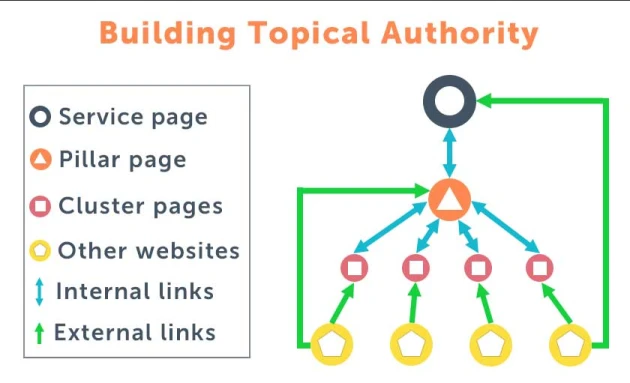
Incorporating topical authority into your SEO strategy is no longer optional—it's a crucial component of positioning your content and brand ahead of competitors. As we delve deeper into the topic, we'll explore what topical authority truly means, its significance, and actionable strategies to cement your brand's position at the top. Dive in to discover the intricacies of topical authority and how it can redefine your SEO strategy.
In the ever-evolving landscape of SEO, where content is king and algorithms are perpetually updated, there emerges a concept that has gained significant traction: Topical Authority. But what exactly is it, and why does it matter in the broader SEO strategy?
Topical Authority in SEO refers to a website's expertise, trustworthiness, and knowledge of a specific topic or niche. It's not just about having a multitude of articles on a subject; it's about the depth, breadth, and quality of the information provided. When a site consistently delivers valuable content on a particular topic, search engines like Google recognize it as an authority in that field.
There are several reasons why establishing topical authority is essential in an SEO strategy:
Trust and Credibility: Just as readers trust experts for advice or information, search engines trust websites with topical authority. A site that's deemed an authority on a topic is likely to rank higher for related queries.
Content Depth: Achieving topical authority implies you're covering a subject in depth, which can lead to increased user engagement and decreased bounce rates. Users are more likely to stick around and explore further if they perceive you as an expert.
Better Backlinks: Other sites are more inclined to link to authoritative sources. Quality backlinks can further bolster your site's ranking and reputation.
Adaptability to Algorithm Changes: SEO isn't static. Algorithms change, but a consistent effort to provide valuable content on a topic can cushion a site against drastic rank drops during updates.
In essence, Topical Authority in SEO is about becoming the go-to resource for a specific niche or subject. It involves comprehensive research, consistent content creation, and a genuine effort to provide value. As SEO strategies evolve, focusing on establishing topical authority can be a game-changer, setting you apart in the crowded digital arena.
Topical Authority in SEO is more than just the ability to cover a subject extensively. At its core, it's about the level of expertise, trustworthiness, and comprehensive knowledge a website displays concerning a specific topic or subject area. This authority is established when search engines and users alike recognize a site as a credible and reliable resource on a particular matter.
Diving deeper into its definition:
In the contemporary SEO landscape, where algorithms prioritize user experience and value, Topical Authority has become a linchpin for success. Here's why:
Thus, the emphasis on Topical Authority in SEO strategy is not a fleeting trend but a reflection of the evolving digital landscape. It underscores the importance of quality, relevance, and expertise in content creation, ensuring that websites not only rank higher but also offer genuine value to their audiences.
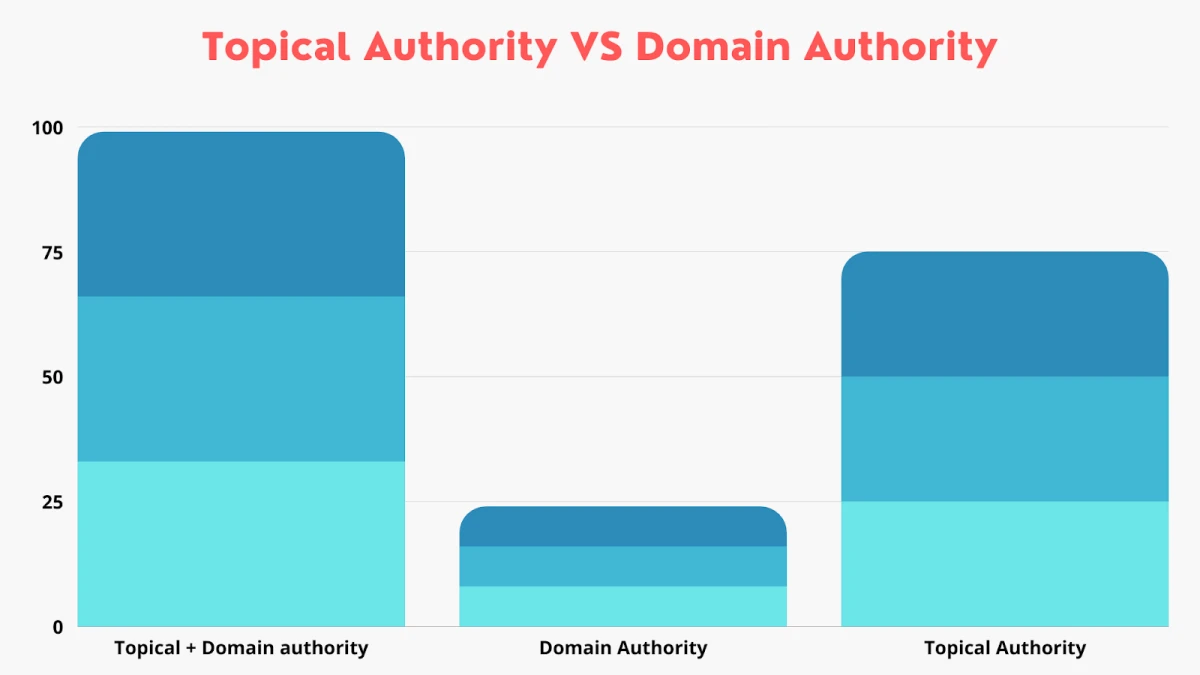
Both Topical Authority and Domain Authority play significant roles in the realm of SEO. While they serve unique functions, their interconnectedness cannot be ignored. Below, we delve into their relationship:
Thus, while Topical Authority and Domain Authority serve distinct purposes in SEO strategy, they are intertwined in their pursuit of offering users the most reliable and pertinent content. Focusing on one can inadvertently boost the other, leading to a more authoritative and trusted online presence.
Topical Authority has become a cornerstone in modern SEO strategy. Ensuring your website is seen as an authoritative figure on specific subjects can significantly boost its visibility and credibility. Below are some streamlined strategies to help you establish and enhance your topical authority:
Incorporating these strategies into your ongoing efforts can solidify your position as a topical authority, ensuring that your SEO strategy aligns with the evolving demands of search engines and user expectations. Remember, in the realm of Topical Authority in SEO, consistency, quality, and engagement are key.
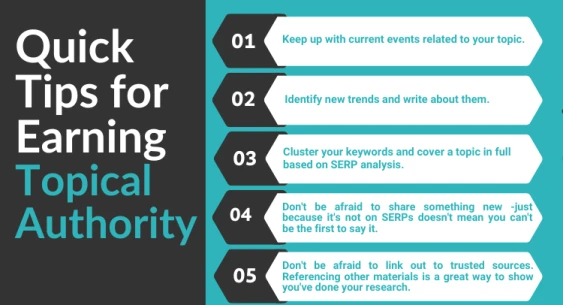
User experience and engagement are central pillars in building Topical Authority in SEO. A tailored SEO strategy prioritizes the user, ensuring content relevance and site usability. When users find value and engage deeply with the content, it enhances the site's topical authority, positioning it as a trusted resource within the domain.
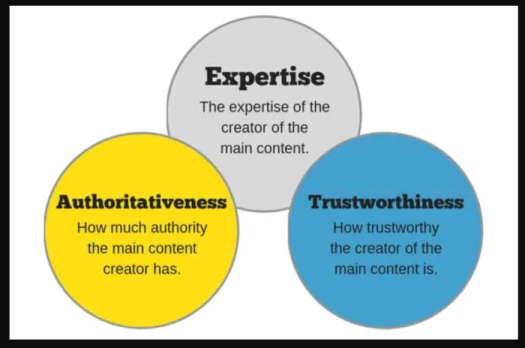
The User is important: Always remember that at the heart of SEO strategy and Topical Authority in SEO is the user. If they find your content relevant and beneficial, they'll engage more, enhancing your authority.
User-Friendly Design: Websites should be easy to navigate, ensuring users can find the information they're looking for without hassle.
Mobile Optimization: With a significant amount of users accessing content on mobile, ensuring mobile-friendliness is paramount.
Interactive Elements: Engage users with polls, quizzes, and interactive infographics that can deepen their understanding and engagement level.
Page Load Speed: Users are likely to leave if a page takes too long to load, affecting your topical authority negatively.
To effectively implement an SEO strategy, it's crucial to gauge the success of Topical Authority in SEO. Utilizing specialized tools and metrics allows webmasters and marketers to assess the impact and strength of their site's topical authority, ensuring alignment with SEO goals and fostering continuous improvement.
Leverage Analytics: Use tools like Google Analytics to see which topics are driving the most engagement on your site.
Page Views and Time Spent: High numbers here indicate your content's relevance and depth.
Bounce Rate: A low bounce rate can be a good indicator of your website's topical authority as users are finding what they're looking for.
Backlink Analysis: Tools like Ahrefs or SEMrush can help assess the quality of backlinks, lending insights into your topical authority.
Several leading brands have harnessed the power of Topical Authority in SEO strategy, elevating their online presence and credibility. By focusing on specific niches and delivering authoritative content, these brands have not only boosted their rankings but also established themselves as trusted voices in their industries. Their success stories serve as inspiring examples for others looking to enhance their SEO approach through topical expertise.
HubSpot: A leader in inbound marketing, HubSpot has established its topical authority by consistently producing high-quality content on digital marketing.
Moz: Renowned in the SEO community, Moz has leveraged topical authority by being transparent and educational.
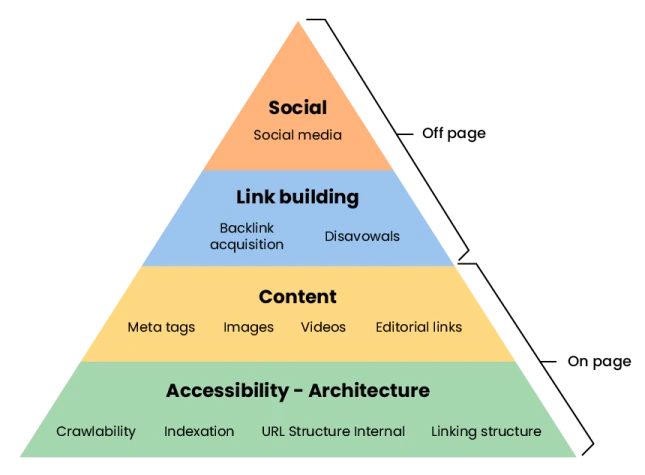
Topical Authority in SEO isn't just a buzzword; it's the future of content marketing. By establishing expertise in specific niches, brands can drive more organic traffic, enhance user trust, and ultimately, convert more leads. However, achieving this authority requires a combination of high-quality content, continuous learning, and a keen understanding of the audience's needs. As search engines aim to deliver the best content to their users, Topical Authority will only become more crucial in the world of SEO strategy. By embracing these principles and continually refining your approach, you can position your brand as a leader in your niche and achieve lasting digital success.
1. What is Topical Authority in SEO?
Topical Authority in SEO refers to a website's expertise and credibility on a specific subject or niche, showcasing its depth of knowledge.
2. How does Topical Authority differ from Domain Authority?
While Domain Authority evaluates a website's overall trustworthiness, Topical Authority in SEO focuses on expertise in a particular topic or niche within that domain.
3. Why is establishing Topical Authority essential for my SEO Strategy?
Emphasizing Topical Authority in your SEO strategy can lead to higher rankings for niche topics, increased trust from users, and better engagement with your content.
4. How can I build Topical Authority for my website?
Building Topical Authority involves creating comprehensive content, continuous updates, engaging with thought leaders, and obtaining backlinks from authoritative sources in the niche.
5. Does user engagement play a role in Topical Authority?
Absolutely. Engaged users often signal that your content is trustworthy and authoritative, reinforcing your site's Topical Authority in SEO.
6. What tools can I use to measure my Topical Authority in SEO?
There are various SEO strategy tools available that assess content quality, backlink profiles, and user engagement to gauge Topical Authority.
7. How long does it take to establish Topical Authority in SEO?
Building Topical Authority is a continuous process. Depending on your niche and SEO strategy, it can range from a few months to several years.
8. Can leveraging Topical Authority in SEO benefit my brand's reputation?
Yes, by becoming an authoritative voice on specific topics, your brand can earn trust and recognition in the industry, enhancing its overall reputation.







































